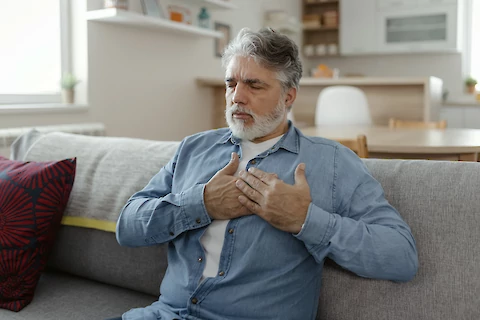
As we honor American Heart Month this February, it's vital for senior men to have a deeper understanding of a condition that poses a significant risk to their health – heart attacks. Often, the symptoms of mild to moderate heart attacks can go unnoticed or be mistaken for other conditions, leading to delayed treatment or worse. Knowledge is power, and when it comes to heart health, it could be a lifesaver.
What Are Heart Attacks?
A heart attack, also known as a myocardial infarction, is a medical condition that occurs when the blood supply to parts of the heart gets blocked. While some heart attacks strike with a sudden and intense impact, mild to moderate ones may not be as noticeable. Statistics from the American Heart Association indicate that heart disease, including heart attacks, is a leading cause of death among men over 65 in the U.S.
Symptoms of a Heart Attack
The typical symptoms of a heart attack include chest pain, shortness of breath, or feeling weak, light-headed, or faint. These symptoms, however, are not always present during mild or moderate heart attacks. Instead, you might feel a mild discomfort in your chest, arm, neck, or jaw, or experience fatigue, sweating, nausea, or heartburn. These signs can be easily dismissed, particularly when they occur in isolation or present as mild discomfort. This underscores the importance of familiarizing yourself with the more unusual symptoms that might go unnoticed.
Identifying a Heart Attack
It is essential to recognize the signs of a heart attack promptly for immediate medical attention. Delay can lead to increased heart damage or even fatal consequences. However, it's possible for some people to have a heart attack without realizing it, particularly if the symptoms are mild or moderate. These "silent" heart attacks often come to light during medical check-ups.
Moreover, some symptoms such as fatigue, reduced physical ability, or indigestion may appear days or even weeks after a heart attack, which can further complicate matters. Being alert and responsive to these subtle changes in your body is crucial.
What to Do If You Suspect You've Had a Heart Attack
Immediate action is key if you suspect you've had a heart attack. Call for emergency medical help right away, and try to stay calm until medical professionals arrive.
If you realize you've had a heart attack days after it happened, contact your healthcare provider as soon as possible. Inform them about the symptoms you experienced and any changes you've noticed since. They can then guide you with the necessary steps, which usually involve various tests and possibly medications.
Follow-up care after a heart attack is critical. Even if you feel fine, attending regular check-up appointments and undergoing recommended tests will help manage risks and prevent further heart damage.
Get Assistance and Care at Home
Understanding the symptoms of a heart attack is essential, especially for senior men who are more susceptible to this condition. Early recognition of symptoms, prompt medical attention, and diligent follow-up care are key to managing heart health and ensuring longevity.
If you are a resident of Scottsdale, Mesa, Paradise Valley, Fountain Hills, or Cave Creek and you require assistance in managing your needs at home, Senior Helpers Scottsdale is here to help. Our team of trained professionals can provide you with essential support and care, giving you the best chance at managing your health effectively. Reach out to us today to learn more about our range of home care services.